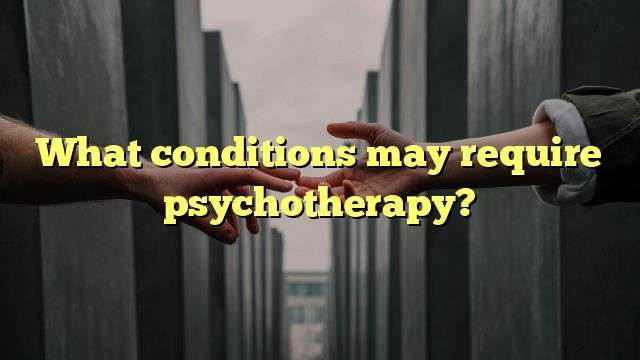What Conditions May Require Psychotherapy?
Psychotherapy is becoming increasingly recognized as an effective treatment for a variety of mental health conditions, including depression, anxiety disorders, borderline personality disorder (BPD), obsessive compulsive disorder (OCD), and post-traumatic stress disorder (PTSD). With the help of a qualified and experienced therapist, individuals can develop effective coping strategies to manage, and even overcome, their psychological issues. In addition, psychotherapy can be beneficial for those facing long-term illnesses, as it can help them better cope with their physical and emotional symptoms.
Depression
Depression is one of the most common mental health conditions, and can be incredibly debilitating. It is characterized by persistent feelings of sadness, worthlessness, and hopelessness, as well as a loss of interest in activities that were once enjoyed. In addition, those who suffer from depression may experience changes in appetite and sleep patterns, fatigue, and difficulty concentrating.
Psychotherapy is a proven treatment for depression, and can help those suffering from the condition to recognize and address the underlying causes of their depression. Through psychotherapy, individuals can learn to identify the negative thought patterns that contribute to their depression, as well as develop healthier coping strategies. Cognitive behavioral therapy (CBT) is a particularly effective form of psychotherapy for depression, as it focuses on helping individuals change their thought patterns and behavior.
Anxiety Disorders
Anxiety is a normal response to stress, and can be beneficial in certain situations. However, when anxiety becomes excessive and persistent, it can be classified as an anxiety disorder. Anxiety disorders can take many forms, including generalized anxiety disorder (GAD), panic disorder, and obsessive-compulsive disorder (OCD). These conditions can be incredibly disabling, as those suffering from anxiety may experience feelings of apprehension, restlessness, and difficulty concentrating.
Psychotherapy can be an effective treatment for anxiety disorders, and can help those affected to identify and address the underlying causes of their anxiety. Cognitive behavioral therapy (CBT) is particularly effective, as it focuses on helping individuals recognize and challenge their negative thought patterns, as well as develop healthier coping strategies. In addition, exposure therapy can help those with anxiety to confront their fears in a safe and supportive environment.
Borderline Personality Disorder (BPD)
Borderline personality disorder (BPD) is a mental health condition characterized by unstable and intense relationships, difficulty regulating emotions, and impulsive behavior. Those with BPD may experience extreme mood swings, as well as difficulty controlling their emotions and behavior. In addition, those with BPD may also struggle with feelings of emptiness and low self-worth.
Psychotherapy is the primary treatment for BPD, and can help those affected to better understand and manage their emotions. Dialectical behavior therapy (DBT) is a particularly effective form of psychotherapy, as it focuses on helping individuals learn to identify and regulate their emotions, as well as develop healthier coping strategies. In addition, psychotherapy can help those with BPD to recognize and address the underlying causes of their condition.
Obsessive Compulsive Disorder (OCD)
Obsessive compulsive disorder (OCD) is a mental health condition characterized by intrusive and unwanted thoughts (obsessions) and repetitive behaviors (compulsions). Those with OCD may experience recurrent, distressing thoughts, as well as an urge to perform certain behaviors in order to relieve the anxiety caused by these thoughts.
Psychotherapy is the primary treatment for OCD, and can help those affected to identify and address the underlying causes of their condition. Cognitive behavioral therapy (CBT) is particularly effective, as it focuses on helping individuals recognize and challenge their negative thought patterns, as well as develop healthier coping strategies. In addition, exposure and response prevention (ERP) is a form of CBT that focuses on helping individuals confront their fears in a safe and supportive environment.
Post-Traumatic Stress Disorder (PTSD)
Post-traumatic stress disorder (PTSD) is a mental health condition that can occur after someone has experienced or witnessed a traumatic event. Those with PTSD may experience recurrent and distressing memories, as well as difficulty sleeping and concentrating. In addition, those with PTSD may also experience heightened levels of anxiety and fear in response to certain triggers.
Psychotherapy is the primary treatment for PTSD, and can help those affected to identify and address the underlying causes of their condition. Cognitive behavioral therapy (CBT) is particularly effective, as it focuses on helping individuals recognize and challenge their negative thought patterns, as well as develop healthier coping strategies. In addition, eye movement desensitization and reprocessing (EMDR) is a form of CBT that focuses on helping individuals confront their traumatic memories in a safe and supportive environment.
Long-Term Illnesses
Living with a long-term illness can be incredibly challenging, as individuals may experience a range of physical and emotional symptoms. Those with long-term illnesses may experience feelings of fear and anxiety, as well as difficulty adjusting to their new reality. In addition, those with long-term illnesses may also struggle with feelings of helplessness and low self-worth.
Psychotherapy can be an effective treatment for those living with long-term illnesses, as it can help individuals to better understand and manage their emotions. Cognitive behavioral therapy (CBT) is particularly effective, as it focuses on helping individuals recognize and challenge their negative thought patterns, as well as develop healthier coping strategies. In addition, psychotherapy can help those with long-term illnesses to recognize and address the underlying causes of their condition.
In conclusion, psychotherapy can be an effective treatment for a variety of mental health conditions, including depression, anxiety disorders, borderline personality disorder (BPD), obsessive compulsive disorder (OCD), post-traumatic stress disorder (PTSD), and long-term illnesses. Through psychotherapy, individuals can develop effective coping strategies to manage, and even overcome, their psychological issues. In addition, psychotherapy can help those with long-term illnesses to better understand and manage their physical and emotional symptoms.
